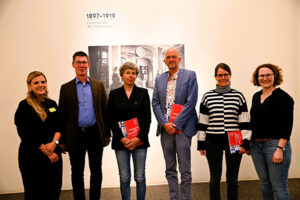Violent crimes and atrocities committed during civil wars and under dictatorships leave deep wounds in societies – and they must not be repeated. But how can an effective ‘never again’ be achieved?
 Dr Karina Mross (German Institute of Development and Sustainability), Prof. Thorsten Bonacker (Centre for Conflict Research, University of Marburg) and Dr Dorothee Weitbrecht (Elisabeth Käsemann Foundation) discussed the potential, limits and challenges of transitional justice in a panel discussion at the ‘Hotel Silber’ memorial site – the former Gestapo headquarters in Stuttgart.
Dr Karina Mross (German Institute of Development and Sustainability), Prof. Thorsten Bonacker (Centre for Conflict Research, University of Marburg) and Dr Dorothee Weitbrecht (Elisabeth Käsemann Foundation) discussed the potential, limits and challenges of transitional justice in a panel discussion at the ‘Hotel Silber’ memorial site – the former Gestapo headquarters in Stuttgart.
Using international examples and reflecting on the German past, the experts shed light on how societies can deal with violent crimes in order to (re)establish peace, security and justice. The discussion took place in the context of the current special exhibition ‘Gestapo on trial’, which focuses on the criminal prosecution of Nazi crimes.
Central questions of the discussion were: To what extent can court proceedings contribute to coming to terms with the past? What role can other instruments of transitional justice play, such as truth commissions, memorials or reconciliation initiatives? And last but not least: Can the German process of coming to terms with the Nazi past serve as a model for other countries – and what lessons can Germany learn from international experience?
The discussion underlined how complex and protracted processes of coming to terms with the past can be. They require not only legal accountability but also societal engagement and a continuous discourse on historical responsibility. Remembrance policy is not merely a backward-looking endeavor—it strengthens democratic awareness and sharpens the perception of threats to our open society. In light of current political developments, it remains essential to actively engage in these debates and to integrate them into school education early on.
